The JHU Press Blog has moved to our newly redesigned website.
Tiffany Gasbarrini to Join Johns Hopkins University Press
We are pleased to announce that Tiffany Gasbarrini will join Johns Hopkins University Press as senior acquisitions editor for Life Sciences. Ms. Gasbarrini comes to the press with notable publishing experience and an impressive record of book acquisitions in STEM fields.
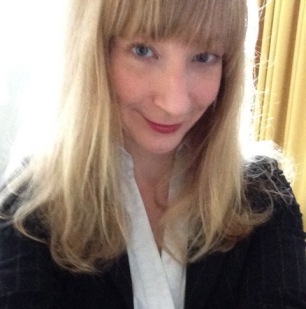
Tiffany was Senior Acquisitions Editor at Elsevier Science & Technology, Inc., where she founded their Renewable Energy publishing program. After 13 years with Elsevier, she took on the role of Senior Acquisitions Editor, Energy and Sustainability, for Springer Nature Group, where she built a diverse portfolio of trade titles, professional references, textbooks, scientific journals, and research monographs. Her expertise focuses on creating impactful Science and Technology book lists through market research-driven analysis of content assets, the development of strategic business plans, and thoughtful collaborations with world-class authors.
Tiffany will take on the Hopkins list in Life Sciences, with special focus on mammalogy, ornithology, ichthyology, herpetology, paleontology, evolutionary biology, wildlife science, and systems ecology.
Ms. Gasbarrini has a degree in literature from Mount Holyoke College, with coursework in publishing at Emerson College and the Publishing Training Centre in Oxford, UK. In her spare time, she enjoys botany, twentieth-century poetry, fantasy/sci-fi, kayaking, scuba diving, and big dogs.
Established in 1878, Johns Hopkins University Press is America’s oldest university press and one of the world’s largest, publishing 90 scholarly journals and nearly 175 new books each year. The Press also manages Project MUSE, the acclaimed online collection of scholarly journals and books.
Tiffany replaces Vincent Burke, long-time executive editor, who retired from the Press earlier this year. Tiffany resides with her family in Massachusetts.
Johns Hopkins University Press is very pleased to welcome a senior editor with the energy, professionalism, and entrepreneurial spirit that Tiffany Gasbarrini has shown.
Please join us in welcoming Tiffany to the Press and to the wider university community.
Comments Off on Tiffany Gasbarrini to Join Johns Hopkins University Press
Filed under Uncategorized
The Hopkins Review Enters New Era
John Irwin, who led The Hopkins Review from its rebirth in 2008, will retire from teaching at Johns Hopkins University this spring. David Yezzi took over the reins of the journal in 2015. A well-known poet, actor and editor, Yezzi joined the Johns Hopkins faculty in 2013. Yezzi joined us to talk about his new position and the special issue devoted to Irwin’s impact on the field.
Comments Off on The Hopkins Review Enters New Era
Filed under Journals, Journals, Literature, Poetry, Poetry, Uncategorized
New Journal Debuts
Earlier this year, JHU press published the first-ever issue of ASAP/Journal, a new journal from The Association for the Study of the Arts of the Present. The quarterly journal promotes intellectual exchange between artists and critics across the arts and humanities. The inaugural issue focused on “Art & the Commons.” Amy Elias and Jonathan Eburne, editors of the journal, joined our podcast series to talk about this exciting new venture.
Comments Off on New Journal Debuts
Filed under Journals
EMILY DICKINSON JOURNAL REACHES 25 YEARS
Emily Dickinson Journal publishes its 25th volume in 2016 under the guidance of a new editor. James R. Guthrie, Professor of English Language and Literatures at Wright State University, now helms the journal. He joined us for a Q&A about his new role and the journal’s anniversary.
How did you come to take the editor position at the journal?
I was invited to take the position by Cristanne Miller, the EDJ‘s previous editor.
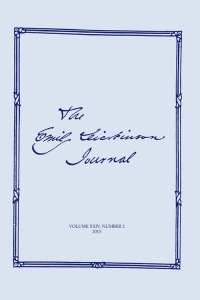 What is one surprising thing you have found in the transition?
What is one surprising thing you have found in the transition?
Learning to use ScholarOne. (Ed: An online system for manuscript submission and review) I was quite intimidated by ScolarOne when I took over the editorship. But now, with two issues under my belt, I’m much more comfortable with that program. ScholarOne is still not as user-friendly as I would prefer, but I’ve come to appreciate what it can do for me, as an editor.
Emily Dickinson Journal will publish its 25th volume in 2016. What does that milestone mean for you?
Twenty-five years is indeed a milestone for the EDJ. Personally, those 25 years coincide roughly with my own scholarly interest in Dickinson. It has been a real pleasure to watch Dickinson move from the fringe of recognized American writers to canonical status. My wife jokes now that she can rarely open an issue of the Sunday New York Times or the New Yorker without coming across a reference to Emily Dickinson. She has definitely entered the mainstream of American culture and literary history.
What kind of plans to you have in the short term for the journal?
Now that I’m more comfortable with the position of editor, I look forward to using the EDJ to encourage growth in particular areas of Dickinson scholarship. For example, I’m interested in encouraging interdisciplinary approaches to her poetry. I also like cultural materialist / new historical approaches. Also, there’s a good deal of interest among Dickinson scholars these days in looking more closely at literary kinships between Dickinson and other 19th-century American writers such as Melville and Thoreau. Then too, Dickinson scholarship has become increasingly international in scope. Foreign scholars have much to offer about the reception of Dickinson’s work in their countries, translations of the poems, and similarities between her work and that of local celebrated authors.
What kind of advice would you give to scholars looking to publish in the journal?
I would certainly advise scholars considering submitting work to the EDJ to go ahead and do so — we welcome any sort of scholarship concerning Dickinson. And Dickinson is something of a hot property these days in scholarship and the media — so young scholars may boost their own careers by focusing more intently upon Dickinson’s work. The network of Dickinson scholars is (drawing upon my own experience) welcoming, receptive to new ideas, and friendly. So, take a chance on Dickinson — I think all of us practicing Dickinson scholars are happy that we did.
Comments Off on EMILY DICKINSON JOURNAL REACHES 25 YEARS
Filed under Journals, Literature, Poetry, Poetry
Feeling Filipinos: Unraveling Thoughts about the Emotional and the (Trans)National
The recent issue of the Journal of Asian American Studies, featured the work of four emergent and established Filipino American scholars. Guest editor Martin Manalansan wrote the introduction to the custer of papers, which we have re-printed here.
Guest post by Martin Manalansan
Nothing more than feelings. So goes the ballad that many older generations of Filipinos in the Philippines and its diaspora have sung for years in their showers and in karaoke parties. Feelings with a “p,” as many Filipinos are prone to do when they pronounce the “f” sound, not only become a marker of linguistic vestiges and accent detection among Filipinos everywhere but also constitute the very process by which a kind of compassionate and progressive analytical rigor about what it means to be Filipino today in a globalized world and during these precarious times. “Feelings” become “peelings” as recent scholarship on Filipinos demonstrate, especially the ones in this special issue, as they focus on exfoliating the layers of affective and emotional matter and discourses that compose and shape Filipino experiences in the homeland and in multiple migratory sites. Feelings and emotions are really nothing more than the semantic, corporeal, and material fuel and animating force of various everyday domestic and public experiences of contemporary life. They are the fulcrum that propels energies toward labor, migration, leisure, and survival. They also compose the various kinds of ecological intensities and contextual moods that circulate among bodies, spaces, and temporalities within and across various geographic scales.
To critically understand Filipinos today constitutes a challenge to confront the constellations of meanings around bodily energies that intersect in various arenas particularly when it comes to making sense of the Filipino nation and its predicament in the twenty-first century. There are multiple levels or strata that need to be peeled away not to come up with a common core or a central truth but to understand the stratigraphic almost palimpsest-like layerings of meaning and matter and the way they “move” and circulate within and across borders. This special issue puts together scholarship that centers the affective, emotional, and sensorial dimensions of how Filipinos negotiate, perform, establish, and/or resist the multiple predicaments of work, family, and nation. From anger to laughter, from the kinetic energy of hip-hop and the atmospheric shifts of humor, the four authors, Nerissa Balce, Allan Isaac, Jeffrey Santa Ana, and Mark Villegas, limn and map the exigencies of citizenship, labor, colonialism, kinship, class, sexuality, race, and gender through the prisms of emotions, feelings, and the senses.
Far from being an audit of such bodily skills and energies, the essays in this special issue argue against the facile binary notions of inner life versus social life, between mind and body, and between the private and public. These skills and energies are not “natural” like breathing. Rather, they are social because they become audible, palpable, visible, and palatable in relation to structured relations of power and historical unfoldings. In other words, Filipino bodily energies from affect to feelings are conditioned not by idiosyncratic personal quirks but by the forces of history, culture, and social hierarchies. Therefore, these bodily energies are part and parcel of world making and world imaginings.
Sara Ahmed, in her book The Cultural Politics of Emotion, astutely notes that such bodily energies are “points of entry,” not static states of being as they “move, stick and slide” across various spheres and realms of social life.1 Feelings and emotions circulate and are the passageways and vessels for the flow of capital and the buttressing of the nation. They are not “internal” or inside the body. Neither are they contained by biochemical drifts and organ function but can be instruments of oppression by much larger systems such as the state and the private corporation. They form part of the grit that causes frictive relationships between family, region, nation, and the globe. As such, emotions and feelings bypass or transgress the very borders they themselves have created.
For example, “care” in the Filipino case takes on a rarefied air of “national character.” Movies, government training programs, slogans, and other cultural genres have produced and disseminated the figure of the “caring Filipino” who is fit and ready for the global service market and corporeally predisposed to serve and be servile. Care uncritically becomes a mark not only of being “human” but of being Filipino. It morphs from being a bodily skill and intensity into an essentializing notion of a nation and a people that is complicit with the workings of late capital. Care is a neoliberal idiom that gets embodied in the day-to-day struggles of Filipino migrant workers who are employed as nannies, maids, drivers, bellhops, cooks, and so on.2 As the primary labor broker, the Philippines state functions not only as a mediating agent but also as a disciplinary conduit that devices, inculcates, disseminates, and manages the emotional scripts necessary for Filipino migrant labor to be marketable and valued.3 Such scripts involve the disciplining or “professionalization” of bodies to specific forms of composures and habits most especially around the arena of work. Therefore, care is a central “proper” emotion that constitutes these scripts underwritten by the Philippine state and the global service industry, and performed by migrant workers on multiple stages across the diaspora.
Emotions and feelings do not just emanate or are produced by biological entities called humans but can also be constituted by material objects and discourses. One needs only to see how a newspaper account, an image on a laptop screen, a tune from the latest pop song, or the smell of flowers can invoke and provoke multiple movements of intensities that make up and conjure various atmospheres. Emotions, feelings, and the senses are the building blocks of social time and space. Therefore, in order to adequately understand the spatial and temporal politics of Filipinos today, one needs to be “attuned” to the moods and “weight” of places and events or how our surroundings impinge on our bodies.
Bodily knowledge is crucial in critically apprehending Filipino experiences today. Consider how Balikbayan boxes from the diasporic elsewhere or packets of sinigang broth from the Philippines can propel or set in motion various ways of acting and being in the world such as being wistful, despondent, hopeful, exuberant, and/or dejected. Such ways of being and acting can be potentially useful pivots in negotiating through the power inequalities and enliven struggles for survival.
The essays in the special issue go beyond the vernacular and conservative meanings of emotions, feelings, and the senses by promoting the ways in which these bodily skills, knowledge, and intensities are not mere reactive impulses that remain within the sphere of the feeling subject or agent. The essays focus on what emotions and feeling “do” and not just merely describing what they “are” beyond being enablers of systemic complicity or propping up the very social order that is meant to oppress them. To put it another way, emotions are neither always passive responses nor just “barriers” or baggage that promote inaction but are or can potentially become “weapons of the weak.” Emotions and feelings are part and parcel of doing or making politics, the struggle for survival, claims of citizenship and of imagining and longing for a world that is not here yet.
As a way to complicate our idea of feelings and emotions, let us go back to the idea of care that has been appropriated by the state and the transnational service industry. Despite the Philippine state’s draconian scripting, care is never pure or unalloyed. In my own studies, care has provided the means for migrant labor to think coalitionally as a collective force to champion their own rights as workers. My own ethnographic interviews among Filipino migrants have shown how the idiom of care has been reconfigured to move away from being a stand-in for docile professionalism to framing and invigorating organizing efforts toward change. Feelings and emotions such as care can trigger and initiate rejection of or surrender to the world at hand. In sum, emotions and feelings either can be used for the maintenance of an unjust status or can form the seeds for resistance and possible social transformation. Despite their conservative deployments by the Philippine state and the service industry, feelings, emotions, and the senses in the Filipino contexts are crucial bodily skills, intensities, and energies that may open up new ways of imagining possible futures, just worlds, and alternative plots of being, living, and surviving as a Filipino in a global world.
Martin F. Manalansan IV is Associate Professor of Anthropology and Asian American Studies and a Conrad Professorial Humanities Scholar at the University of Illinois, Urbana-Champaign.
Notes
Sara Ahmed, The Cultural Politics of Emotion (New York: Routledge, 2004), 14.
Rhacel Parreñas and Eileen Boris, eds., Intimate Labors: Culture, Technologies and the Politics of Care (Stanford, Calif.: Stanford University Press, 2010).
Anna Romina Guevarra, Marketing Dreams, Manufacturing Heroes: The Transnational Labor Brokering of Filipino Workers (New Brunswick, N.J.: Rutgers University Press, 2009); Robin Magalit Rodriguez, Migrants for Export: How the Philippine State Brokers Labor to the World (Minneapolis: University of Minnesota Press, 2010).
Comments Off on Feeling Filipinos: Unraveling Thoughts about the Emotional and the (Trans)National
Filed under Journals
Steve Grant’s First Folio Tour
This year, in honor of the 400th anniversary of the death of William Shakespeare (on April 23, 1616), the Folger Shakespeare Library has organized an extraordinary tour of First Folios from the Folger collection to all fifty states. Steve Grant, author of our widely-admired Collecting Shakespeare: The Story of Henry and Emily Folger, has undertaken an similarly ambitious speaking schedule that will take him to several of the hosting libraries, museums, and institutions participating in the tour. We’ve invited Steve to provide regular updates as he follows the First Folios around the country, speaking about their important literary and cultural history the extraordinary legacy of Henry and Emily Folger.
Guest post by Stephen H. Grant
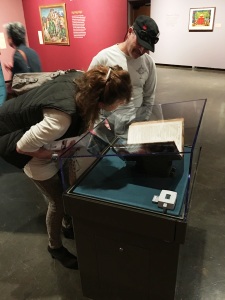
On display in the New Mexico Museum of Art during February, 2016, Shakespeare’s First Folio open to the “To Be or Not To Be” speech in Hamlet.
Partnering with St. Johns College in Santa Fe, the New Mexico Museum of Art won the competition to host the First Folio Exhibition from February 5 to February 28, 2016. While the Folger Shakespeare Library in Washington DC––only two blocks from the U.S. Capitol––required that host institutions organize at least FOUR events during the exhibit, the Museum arranged FORTY events.
One event was the Shakespeare Treasure Hunt. Youngsters picked up a free treasure map and followed clues based on quotations from the Bard that led them downtown to declaim the lines to local merchants. Visitors from the London Academy of Music and Dramatic Art put on a workshop on the breath, sound, and articulation on Shakespeare’s sonnets, including practice in reading Shakespeare out loud. The Museum organized a day of love and art where participants created cards, heart ornaments, and Valentine’s Day collages inspired by Shakespeare.
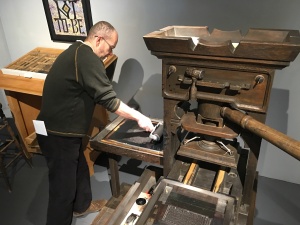
Director of the Palace Press at New Mexico History Museum in Santa Fe, Tom Leech, demonstrates a wooden hand press like those used in early 17th century England.
Of all the First Folio Exhibit venues, New Mexico is the only state where a government was operating when Shakespeare was alive and writing The Tempest. Across the street from the New Mexico Museum of Art is the New Mexico History Museum, created in 1610 as Palace of the Governors, when Spain established its seat of government in Santa Fe to cover what is now the American southwest. It is the oldest continuously occupied building in the United States. Award-winning Palace Press printers Tom Leech and James Bourland mounted a multi-part exhibit where they printed facsimiles of a First Folio page using a replica Gutenberg wooden hand press. Visitors were invited to make their own prints to take home.
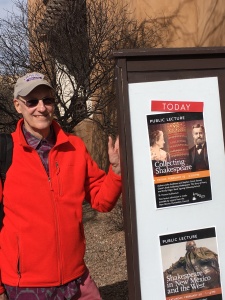
Steve Grant outside New Mexico Museum of Art before his talk to 200 enthusiastic Shakespeare addicts.
In Conversation with John F. Andrews, President of the Shakespeare Guild, I spoke in St. Francis Auditorium on Collecting Shakespeare and the First Folio to 200 Shakespeare enthusiasts come from the area to catch a glimpse of the First Folio on display in an adjacent room and opened to the “To Be or Not To Be” soliloquy from Hamlet. The Shakespeare Society bid adieu to the First Folio on February 28 by performing familiar farewell scenes from Shakespeare.
Stephen H. Grant is the author of Collecting Shakespeare: The Story of Henry and Emily Folger, published by Johns Hopkins. He is a senior fellow at the Association for Diplomatic Studies and Training and the author of Peter Strickland: New London Shipmaster, Boston Merchant, First Consul to Senegal. We expect Steve’s next report on the First Folio tour after he speaks in San Diego on June 22 the San Diego Public Library.
STEVE’S 2016 FIRST FOLIO TOUR
April 15, Noon
The Association of the Oldest Inhabitants of D.C.
Capitol Skyline Hotel, 10 I St., SW, Washington, D.C. 20024
OPEN TO MEMBERSHIPTom Leech designed and printed this “WANTED Willy the Kid” poster displayed in many Santa Fe store windows during the residence of the Folger Shakespeare Library’s Shakespeare First Folio.
April 18, 10:30 am – noon
Live & Learn Bethesda Talk
4805 Edgemoor Ln, Bethesda, MD 20814
REGISTRATION REQUIREDJune 21, 11:00 am
Calvary Presbyterian Church Seniors Program Talk
2515 Fillmore St. San Francisco, CA 94115
PRIVATE EVENTJune 22, 6:30 pm
San Diego Public Library Talk
330 Park Blvd., San Diego CA 92101
FREE & OPEN TO THE PUBLICJune 23, 6:00 pm
San Francisco Public Library Talk
Main Library, Koret Auditorium, 100 Larkin St, San Francisco CA 94102
FREE & OPEN TO THE PUBLICSeptember 29, 6:30 pm
Cathedral West Condominiums Talk
4100 Cathedral Ave. NW, Washington DC, 20016
FOR RESIDENTS AND GUESTS
Comments Off on Steve Grant’s First Folio Tour
Filed under Book talks, Libraries, Literature, Shakespeare
The Philosophy of Editing
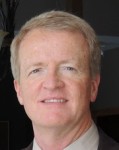 An editorial change took place at the Journal of the History of Philosophy last year as Jack Zupko took over the top position for the journal from Steven Nadler. Zupko had previously served as Book Review Editor for JHP, which celebrated 50 years of publishing several years ago. Chair of the Philosophy Department at the University of Alberta, Zupko joined our podcast series to talk about his transition into the new position as well as plans for the future for JHP.
An editorial change took place at the Journal of the History of Philosophy last year as Jack Zupko took over the top position for the journal from Steven Nadler. Zupko had previously served as Book Review Editor for JHP, which celebrated 50 years of publishing several years ago. Chair of the Philosophy Department at the University of Alberta, Zupko joined our podcast series to talk about his transition into the new position as well as plans for the future for JHP.
Comments Off on The Philosophy of Editing
Filed under History, Journals, Philosophy, Podcasts
An Equation for Every Occasion: Pi Day
Happy Pi Day, readers! In between celebratory pie samplings, get an inside look at the historical context of this famous Greek letter as told by John M. Henshaw, author of An Equation for Every Occasion: 52 Formulas and Why They Matter, coming in paperback this summer.
Click here for pi goodness.

Looking for more historical context from “Equationland”? Use promo code “HDPD” to receive a 30% discount when you order your copy of An Equation for Every Occasion.
Comments Off on An Equation for Every Occasion: Pi Day
Filed under Uncategorized



You must be logged in to post a comment.